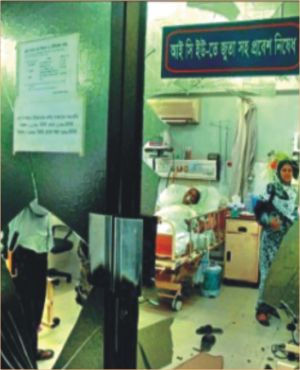 |
|||||||||||||||||||||||||||
| Volume 6 | Issue 08 | August 2012 | | |||||||||||||||||||||||||||
Inside
|
Clinical Negligence ESHITA TASMIN analyses the existing set of medical laws in Bangladesh to show that our country does not have any law or designated government body to bring to book health professionals guilty of clinical negligence. Introduction: Before delving into different areas of clinical negligence it is relevant to draw some attention to the concept of negligence. The word “negligence” is mostly attached to the law of tort. Doctors and nurses are expected to provide excellent and expert treatment to their patients. And if anyone has to suffer injury for the lack of such care than the treating doctor is required by his governing body to inform the patient or any one on behalf of the patient that what went wrong regarding that treatment. If injury or death is caused during the treatment because of such a breach of duty of care, then the victims are suffering from clinical negligence in which case, the suffered party should be entitled to get the compensation from the responsible doctors or from the clinic or hospital s/he works for.
Medical negligence in Bangladesh: According to Article 15, "It shall be a fundamental responsibility of the state to attain, through planned economic growth, a constant increase of productive forces and a steady improvement in the material and cultural standard of living of the people with a view to securing to its citizens- 1) the provision of the basic necessities of life, including food, clothing, shelter, education and medical care. Article 18 says, "The state shall regard the raising of the level of nutrition and improvement of public health as moving its primary duties, and in particular shall adopt effective measures to prevent the consumption, except for medical purposes or for such other purposes as may be prescribed by law, of alcohol and other intoxication drinks and of drugs which are injurious to health. Basic healthcare facilities are also guaranteed in the United Nations Charter. Chapter 9 of the UN charter describes the provisions for International Economic and Social Co-operation. Article 55 relates to the provision regarding health/medical care. The article says that with a view to creating "conditions of stability and well being which are necessary for peaceful and friendly relations among nations based on respect for the principle of equal rights and self-determination of peoples, the United Nations shall promote: solution of international economic, social, health and related problems and international cultural and educational co-operation. Article 62 says that the Economic and Social Council may make or initiate studies and reports with respect to international economic, social, cultural, educational, health and related matters and may make recommendations with respect to any such matters to the General Assembly, to the Members of the United Nations, and to the specialized agencies concerned. Rights to basic healthcare facilities are also guaranteed in the Universal Declaration of Human Rights (UDHR). On 10th December, 1948, the United Nations general assembly adopted this universal declaration of human rights as a result of the Second World War. The UN charter was decided to be complemented with a road map to guarantee the human rights of every individual. Article 25 of the UDHR needs to be mentioned which ensures the health care. According to this article, everyone has a right to a standard of living adequate for the health and wellbeing of himself and of his family including food, clothing, housing and medical care and necessary social services, and the right to security in the event of unemployment, sickness, disability, widowhood, old age or other lack of livelihood in circumstances beyond his control. Unfortunately in Bangladesh, we do not have separate statutory provisions regarding clinical negligence; nor do we have any separate law to deal with these issues. Nevertheless, there are quite a number of laws and acts which relate to a whole gamut of medical issues. Bangladesh Medical & Dental Council Act, 1980 The Public Health (Emergency Provisions Ordinance), 1944 There are many other acts and regulations regarding medical issues, theses are- The Prevention of Malaria (Special Provisions) Ordinance, 1978 These are the acts and regulations which mostly describe the matters related to medical, drugs, diseases, qualifications of medical persons including doctors, nurses and other stuffs. Some of these ensure the standard of the services, drugs and quality of other services. But none of these provide the provisions to handle and provide the remedies if health professionals are found guilty of discharging their duties. Resultantly, there is no governing or regulating body to hold doctors accountable in case of their negligence which in numerous cases has seen patients die or suffer immeasurably. Occurrence of clinical negligence is not new in Bangladesh even though trying to find out a mechanism to reverse this trend is quite new. The term clinical negligence clearly falls within tort liability. But in Bangladesh this type of laws are not welcome. There is no particular law or no statutory provisions for this and there are only some scattered references which are to be followed when a problem arises and which do not bring about any result in the patients' favour. No organized authority exists to monitor whether the duties of doctors are followed in the right manner or not. Consequently, normal people feel helpless and whenever they need medical service, they just go for treatment to the doctors with some blind trust nurturing in their hearts. But if the government really wants to bring all elements of negligence to heel, then a comprehensive law regarding medical negligence and useful authority to monitor and regulate the sector must be formed immediately. If such a law is formulated, doctors will not be able to avoid their responsibilities towards their patients because even if they do, then the law will have strong provisions to scrutinize the doctors' faults judicially. Eshita Tasmin is lecturer, Faculty of Law, Dhaka International University.
|
||||||||||||||||||||||||||

